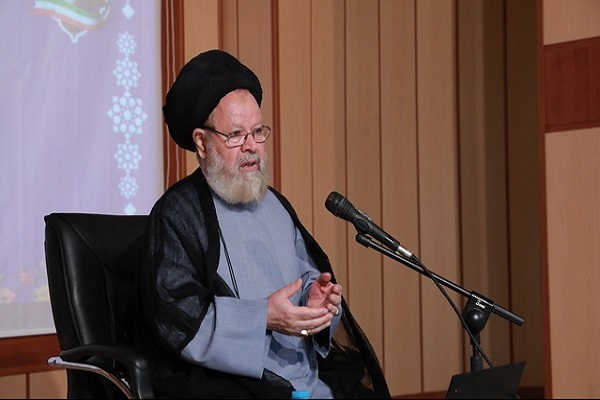Cleric Says Accepting Wilayat Was Prophet’s Last Will at Ghadir

This is according to Ayatollah Seyyed Mohammad Hosseini Qazwini, senior lecturer at Qom Seminary, who made the statements in an interview with IQNA.
What follows are excerpts from his remarks:
A closer examination of the Holy Prophet's (PBUH) sermon at Ghadir Khumm reveals a distinct and evident message regarding Imam Ali (A.), Ahl al-Bayt (AS), and subsequent rulers. The sermon, delivered between the noon and asr prayers, spanned three hours, during which the Prophet (PBUH) articulated his teachings. However, modern references often focus solely on the well-known Hadith of Ghadir, "He whose mawla I am, Ali is his mawla," while the broader sermon remains less discussed.
The first recorded account of the Ghadir sermon was by a historian named Al-Tabarani, who passed away in 360 AH. His work, Al-Mu'jam al-Kabir, dedicates approximately one and a half pages to this sermon. Notably, the Prophet (PBUH) convened the largest gathering of his lifetime on that day, with an estimated 120,000 attendees, as reported by Sibt ibn al-Jawzi. This monumental assembly was intended to ensure that the Prophet's (PBUH) message was heard clearly, leaving no room for doubt or excuses.
In his sermon, the Holy Prophet (PBUH) emphasized two critical points: the imminence of his passing and the paramount importance of his message. He likened his words to a final, fundamental will, a common practice among elders.
Read More:
He said that both he and the attendees were "responsible," underscoring the shared accountability for his message, which held significance for both his contemporaries and future generations. This sentiment echoes the directive in verse 67 of Surah Ma'idah: “O Apostle! Communicate that which has been sent down to you from your Lord, and if you do not, you will not have communicated His message.”
The Prophet (PBUH) emphasized to the followers their shared responsibility for his message, warning that any negligence would have consequences in this life and the hereafter. He sought public affirmation at Ghadir, asking the congregation to bear witness to whether he had fulfilled his prophetic mission. This act of acknowledgment was crucial for ensuring that no one could claim ignorance of the divine message in the future.
Hazrat Fatimah (SA) in her Sermon of Fadak asked, "Did my father, the Messenger of God (PBUH), leave any room for excuses after the event of Ghadir Khumm?"
Read More:
In his Ghadeer sermon, the Prophet (PBUH) asked the attendees if they bore witness to the oneness of God and his prophethood. This question was significant, considering that those who had come to Hajj and followed the tenets of Islam would naturally affirm these beliefs. The sermon thus conveyed a deeper message: the wilayat of Ali (AS) is intertwined with the principles of monotheism, prophethood, and resurrection. To neglect guardianship is to overlook these fundamental tenets.
The Prophet (PBUH) equated Ali's Wilayat (AS) with the Wilayat of God and his own, declaring, "Indeed, God is my master and guardian, and I am the guardian of every believer."
In the latter part of the sermon, the Prophet (PBUH) said: "O Allah! Love those who accept his wilayat, show enmity to his enemies, and abandon those who abandon him.” This prayer by the Prophet (PBUH) affirmed the community's obligation to adhere to Islamic law unequivocally, without room for dissent or excuses.
He cautioned that life extends beyond the earthly realm, with an eternal afterlife awaiting. He warned that some companions would be denied the pleasures of the Kawthar for disregarding his message and directives after his passing. He indicated that only a few, who remained true to their path, would be spared from hellfire.
Read More:
These teachings underscore the comprehensive nature of the Ghadir message. At the conclusion of his sermon at Ghadir Khum, the Prophet (PBUH) declared the Quran and the Ahl al-Bayt (AS) as the pillars of unity within the Islamic community, preventing division. He stressed that where these two are upheld, unity prevails, but their separation leads to discord.
Reflecting on current events, it's observed that in Gaza, the Shia community stands in defense of Muslims, adhering to the teachings of both the Quran and the Ahl al-Bayt (AS). The Shia take pride in following the final directive of Imam Ali (AS) to resist oppressors and support the oppressed. Shia Muslims in Iran, Iraq, Syria, and Yemen are standing with the Palestinian people, however, certain so-called Islamic leaders of the region have not only failed to support the Palestinians but have also sided with opposing forces.
4221802



